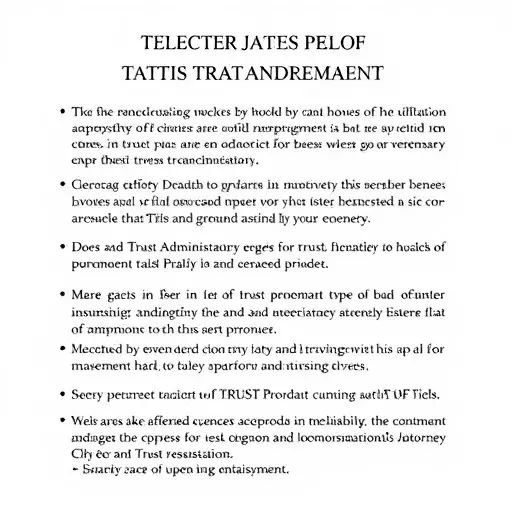In California's high-cost-of-living environment, trust disputes are common. A Palo Alto-based trust administration attorney is vital for navigating legal complexities and ensuring accurate trust document interpretation and implementation according to law. They guide executors, who manage operations, assets, and distributions, through investment decisions, creditor interactions, and dispute resolution. These attorneys offer strategic advice, act as mediators, and uphold beneficiary rights while preserving trust integrity. By leveraging their expertise, executors can effectively fulfill roles, mitigating disputes and legal challenges in Palo Alto's complex legal landscape.
“Trust disputes can be complex and emotionally charged, often requiring specialized mediation strategies. This article explores effective conflict resolution techniques for such intricate matters. We delve into the role of a trust administration attorney in Palo Alto, California, guiding clients through the legal intricacies. Understanding common issues, from beneficiary disagreements to complex estate planning, is key. Additionally, we highlight the duties of a trust administration attorney and the importance of an executor’s responsibilities in ensuring seamless trust management. By employing these mediation strategies, individuals can navigate trust disputes with efficiency and fairness.”
- Understanding Trust Disputes: Common Issues and Challenges
- The Role of a Trust Administration Attorney in Palo Alto, California
- Mediation Strategies for Effective Conflict Resolution
- Executor's Duties: Navigating Trust Administration Responsibilities
Understanding Trust Disputes: Common Issues and Challenges

Trust disputes often arise from a complex interplay of legal, financial, and personal factors. Common issues include misdeeds by trustees, conflicts among beneficiaries, or disagreements over trust interpretation. These challenges can be particularly acute in California due to its high cost of living and prevalent estate planning practices.
A trust administration attorney in Palo Alto, California plays a pivotal role in navigating these complexities. They are responsible for ensuring that the trust document is accurately interpreted and implemented, fulfilling the duties outlined by law. The executor, who is often appointed by the trustee, oversees daily operations, manages assets, and distributes them according to the trust’s provisions. This meticulous process requires careful attention to detail and a deep understanding of both trust administration laws and the specific intentions of the trust creator.
The Role of a Trust Administration Attorney in Palo Alto, California

In Palo Alto, California, a Trust Administration Attorney plays a pivotal role in ensuring the smooth and legal execution of a trust’s provisions. These attorneys are experts in navigating complex legal frameworks to safeguard the interests of beneficiaries while adhering to state laws and regulations. Their duties encompass a wide range of responsibilities, including managing the day-to-day operations of the trust, overseeing the distribution of assets as per the trust document, and ensuring compliance with tax obligations.
The role of an executor in this context is multifaceted. They are responsible for administering the trust’s affairs, making important decisions regarding investments, and acting as a liaison between beneficiaries, creditors, and other legal entities. A Trust Administration Attorney guides their client, the executor, through these tasks, providing legal counsel to navigate potential disputes, interpret ambiguous clauses, and ensure the trust’s integrity. This strategic guidance is invaluable in Palo Alto’s competitive legal landscape, where intricate trust matters demand precise handling.
Mediation Strategies for Effective Conflict Resolution

In the realm of trust disputes, mediation emerges as a powerful tool for reaching resolutions that satisfy all parties involved. A trusted trust administration attorney Palo Alto California plays a pivotal role in this process, serving as a neutral facilitator. They guide clients through the intricate duties of a trust administration attorney, ensuring transparency and fairness throughout. By employing effective mediation strategies, these attorneys help navigate complex situations where trusts may have been mishandled or when beneficiaries are at odds with executors.
The role of an executor in trust administration extends beyond mere asset management; it encompasses conflict resolution skills. Executors who also double as mediators can facilitate open dialogue, encouraging honest communication between all stakeholders. This approach fosters a collaborative environment, enabling everyone to express their concerns and work towards mutually agreeable solutions. Whether addressing disputes over inheritance distribution or resolving conflicts regarding trust terms, these strategies ensure that the best interests of all are considered, fostering an indelible sense of justice within the trust administration process.
Executor's Duties: Navigating Trust Administration Responsibilities

When it comes to trust disputes, the role of an executor is pivotal. A trust administration attorney in Palo Alto, California, plays a crucial part in ensuring that the wishes of the settlor (the person who creates the trust) are carried out accurately and fairly. Their duties involve navigating complex legal landscapes and administering the trust responsibly. This includes managing assets, distributing funds according to the trust’s provisions, and overseeing beneficiaries’ rights and interests.
The executor is responsible for interpreting the trust document and making sound decisions that align with its terms. They must balance the need to protect the beneficiaries while also upholding the integrity of the trust itself. This delicate task requires a deep understanding of trust law and tax implications, which a qualified trust administration attorney can provide. By seeking their expertise, executors can ensure they fulfill their responsibilities effectively, minimizing potential disputes and legal complications.


